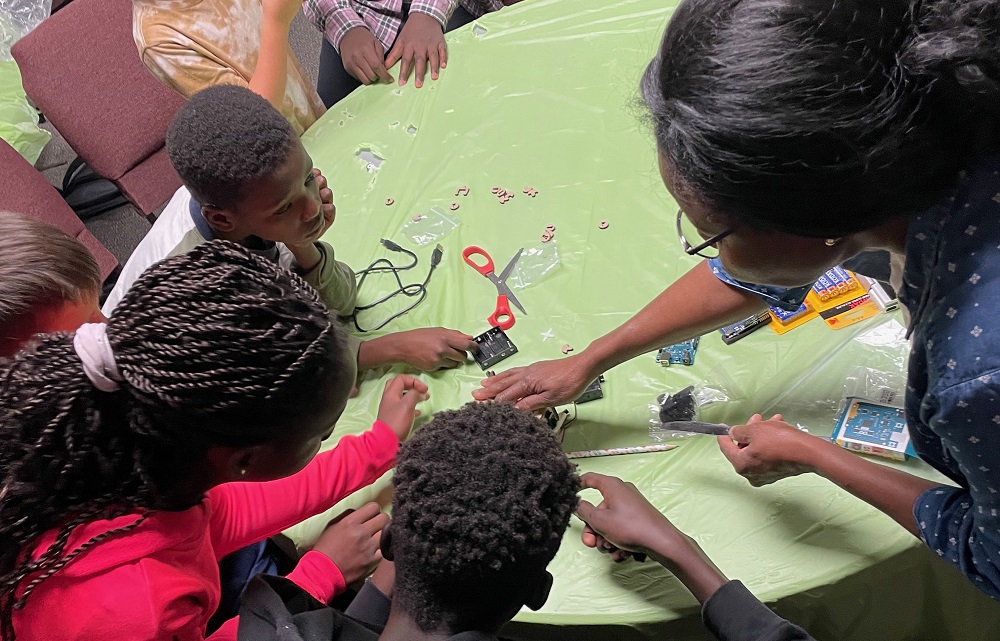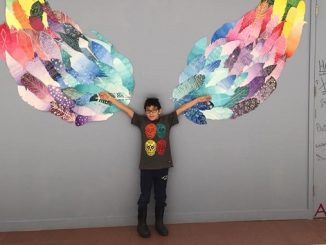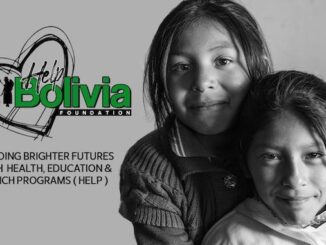We recently had the opportunity to interview Camilia Thieba, the CEO and founder of Hakili Community for Sustainable Development, a black-led registered Canadian charity dedicated to addressing poverty. Established in 2016 and based in Calgary, Alberta, Hakili employs a multidisciplinary team that collaborates with community members to devise solutions with generational impact and sustainable change.

Describe your charity/non-profit/volunteer work in a few sentences.
Hakili Community for Sustainable Development is a black-led registered Canadian charity founded in 2016. Based in Calgary, Alberta, we are dedicated to addressing poverty. Led by a multidisciplinary team working with community members to devise solutions with generational impact or sustainable change. Hakili’s efforts reflect a holistic approach to poverty alleviation, emphasizing education, empowerment, and inclusion in the digital landscape, through collaborative efforts and innovative programs like YesWeCode. This flagship initiative, YesWeCode, provides comprehensive coding education and resources to children and youth, preparing them for success in the 21st-century job market and beyond.
What problem does it aim to solve?
Central to Hakili’s mission is its belief in leveraging innovation to tackle social challenges like intergenerational poverty. One of its primary focuses as a lever of sustainable development is advancing digital literacy and ensuring equitable access to technology. It recognizes the importance of bridging the digital divide to empower individuals from all backgrounds to thrive in the digital era.
When did you start/join it?
The journey of Hakili began in 2016 when a group of community members noticed a growing issue. Many racialized families, both new and established, were struggling to integrate into Canadian society. These struggles were not just professional but also financial, creating a cycle of stress and hardship that would spill over to the children. With increased stress and seemingly disengagement from parents, children were at an increased risk of developing emotional and behavioural issues. These issues would impact their academic performances, social skills, and mental and physical health, ultimately affecting their success and integration, thus perpetuating the cycle of disenfranchisement.
What made you want to get involved?
What drove me to get involved was a deep passion for social justice and a firm belief in the potential of children as the future. As someone who belongs to a racialized community and values education, I felt a personal responsibility to create an environment where future generations could thrive. When I saw persistent patterns of inequality, it became clear to me that we needed to take a step back and ask ourselves why these disparities existed. Drawing from my experiences in Child and Family Services, I understood the profound impact that support can have on the trajectory of families and children. My mission was to level the playing field for all children, regardless of their background, by addressing these systemic inequalities.
What was the situation like when you started?
When Hakili first began, right amid the 2014 economic downturn, the situation was particularly challenging. Alberta, known for its reliance on the oil industry, was hit hard by plummeting oil prices during that time. This economic crisis had a ripple effect across the province, impacting various sectors and communities. In this context, there was a noticeable absence of free programs for families. This created additional difficulties for parents already grappling with the complexities of integration, as they found themselves competing for the limited spots available in digital literacy programs. Compounding the issue was the observation that these programs predominantly catered to children from affluent backgrounds, where both parents were actively involved, English-speaking, and possessed a keen interest in the tech industry. This disparity underscored the pressing need for equitable access to digital education across all socioeconomic strata.
How has it changed since?
Since then, Hakili has made significant strides in transforming the lives of children and families through our flagship program, YesWeCode. With the support of funding from the Calgary Foundation and federal funding for black-led communities, we have provided children with access to high-quality computer science education, regardless of their background. We start teaching kids as young as 7 years old how to code, equipping them with the skills to create websites, apps, and more. Many of our young participants have embraced these newfound possibilities, even teaching their parents and siblings and using their coding skills to support causes they care about or enhance family businesses.
Last year alone, our program delivered over 40 hours of coding instruction to 75 children, totalling over 3000 hours of coding collectively. The impact has been profound. Participants have developed their digital skills and confidence and shown greater academic success and aspirations for their future careers. Beyond just learning coding, our program has a ripple effect on children and their families. Our data shows that 100% of parents have noticed their child becoming more creative and developing a deeper interest in STEM subjects. Families have also seen more conversations about science and technology at home, fostering a greater interest in these subjects outside of the program. Furthermore, 80% of parents have observed remarkable improvements in their child’s personal growth, including better goal setting, taking responsibility for their actions, and gaining self-confidence—essential leadership skills that will serve them well throughout their lives. With 75% of parents reporting improvements in their child’s academic performance since joining our program, we are more determined than ever to advocate for continued investment in programs like ours for black youth. These statistics demonstrate the transformative power of our program on the trajectory of young minds. We are incredibly proud to witness children unlocking their potential, embracing creativity and STEM, developing essential life skills, and excelling academically. With our program, we are shaping confident, capable, and successful individuals who are prepared to tackle the challenges of the future head-on.
What more needs to be done?
In today’s world, digital literacy is more critical than ever. For students, K-12 education offers a foundational opportunity to develop these skills, experiment with technology in a guided environment, and learn how to navigate the digital world safely and meaningfully. However, there are significant inconsistencies in K-12 digital literacy education across Canada. While some schools have access to cutting-edge technology and robust digital programs, others struggle with outdated resources and curricula. This digital divide has far-reaching consequences, impacting students’ future career opportunities and choices. Beyond just coding skills, a computer science education fosters the development of critical thinking, problem-solving, and analytical abilities that are invaluable in all aspects of life and work. These skills empower students to become future leaders capable of addressing complex challenges, making informed decisions, and contributing meaningfully to society. As a black-led charity, Hakili Community is committed to addressing the systemic issues that fuel poverty in Canada and worldwide. Our dedication to expanding initiatives like ‘Yes We Code’ demonstrates our commitment to bridging the digital divide and empowering marginalized communities through education. However, much work must be done to ensure equitable access to digital education for all. By advocating for improved digital literacy education and addressing systemic inequalities, we can create a more inclusive and prosperous future for all.
How can our readers help?
In support of our initiatives, we are excited to launch Computer Science Education for All—Phase 2, to further develop our coding programs, scholarships, and resources for Canadian youth. Sponsorship opportunities are available for businesses and organizations that share our commitment to expanding access to coding education. In Phase 2 of “Computer Science Education for All,” we aspire to amplify and evolve with the tech industry.
We invite you to join us on this transformative journey as we continue to bridge educational disparities, break down barriers, and empower marginalized communities to thrive in the world of technology. Together, we can ensure that computer science education truly becomes accessible to all.
Do you have any events coming up?
Yes! We are excited to announce our upcoming gala event, Tech Futures. All funds raised will support our Computer Science Education for All—Phase 2, further developing our coding programs and scholarships for Canadian youth. We are actively looking for Sponsors for the Tech Future Gala.
Where can we follow you?
You can follow our journey and support our mission through the following channels:
Website | Facebook | Instagram




